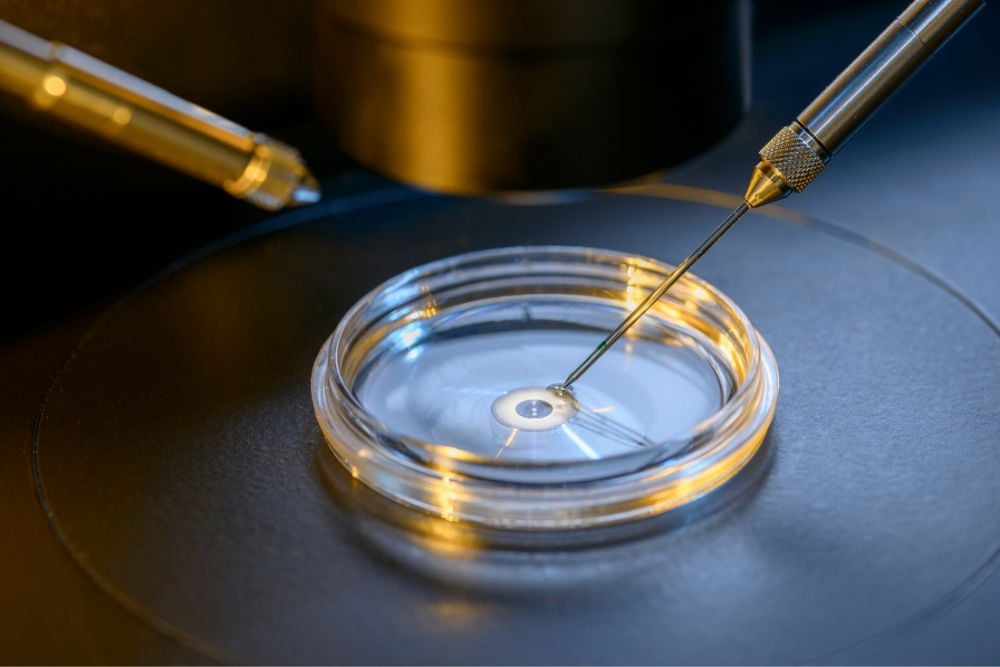Surrogacy and Fertility Treatment: Understanding the Role of IVF
In vitro fertilization (IVF) stands out as the most prevalent fertility care method used today due to its remarkable success rates in helping many people achieve pregnancy. IVF also plays a critical role in the gestational surrogacy process. But what exactly is IVF, and how does a surrogate become pregnant using this cutting-edge technology?

IVF and Surrogacy
Gestational surrogacy involves carrying and giving birth to a baby for another individual or couple, also referred to as the intended parent(s). Some common reasons that intended parents choose to pursue gestational surrogacy as their path to parenthood include:
Same-sex male partners
Structural uterine problems or no uterus (e.g., after a complete hysterectomy)
A medical condition that puts a person at risk when becoming pregnant
Past delivery complications or difficult past pregnancies
Medical conditions that make the uterus unsuitable for pregnancy (e.g., extensive uterine fibroids or scarring)
A medical condition that puts a person at significant medical risk if they become pregnant
Recurrent miscarriages or repeated failure of IVF
Because of IVF, these challenges to conception and pregnancy can be circumvented through gestational surrogacy.
A traditional, non-surrogacy IVF cycle involves hormonal medication to induce ovulation during close medical observation. Multiple eggs are developed in a single ovulation cycle and then extracted from the ovaries when they’ve reached the ideal level of maturation. The eggs are combined with sperm in a lab dish to encourage natural fertilization. Once fertilization occurs and the embryo matures, a fertility specialist transfers the embryo to the uterus with the goal of establishing a pregnancy.
In surrogacy, the IVF process has many similarities but is a little different:
Egg Retrieval: As with a traditional IVF cycle, the intended mother will undergo ovarian stimulation to produce multiple eggs in a single cycle, which are then retrieved using an aspirating needle guided by ultrasound. However, if using an egg donor, this process will also be a little different than the typical egg retrieval method, which we’ll discuss later.
Sperm Collection: Sperm is collected from the intended father, most commonly through ejaculation. The sperm will then go through a process called sperm washing so that only the highest quality sperm are used. If you’re using a sperm donor, the sperm sample will already be available and ready for use.
Fertilization: The egg and sperm are combined in a petri dish to allow natural fertilization to occur. In some cases, a fertility specialist may employ a technique called intracytoplasmic sperm injection (ICSI), in which a single sperm is injected into the egg.
Embryo Development: After fertilization, the embryos are monitored to ensure healthy growth and development.
Embryo Transfer: Once the embryos have developed for a few days, they are either transferred to the surrogate’s uterus (which has been specially prepared to receive the embryos) or frozen so that they can be transferred later.
Surrogacy and IVF While Using an Egg Donor
Some intended parents also require the use of donated eggs to complete their surrogacy journey. This mainly impacts how the eggs are retrieved from the donor and when the embryo is transferred to the surrogate’s uterus. There are actually two different types of egg donation cycles: fresh and frozen. Fresh egg donor cycles involve synchronizing the cycles of the egg donor and the surrogate – everything is carefully planned and timed so that the eggs are retrieved and fertilized at the right moment to be transferred to the surrogate. With frozen egg donor cycles, synchronization is not necessary – eggs are retrieved from the donor and frozen until they’re ready to be thawed, fertilized, and used in IVF.
Get More Information
Fertility care and gestational surrogacy are complicated topics that involve medical, emotional, legal, and financial complexities. If you have questions about gestational surrogacy, how to get matched, surrogacy costs, or any other inquiries, contact West Coast Surrogacy in Viejo, Los Angeles, or Sacramento, California, or visit our surrogacy FAQ for intended parents page. You can also register as a prospective parent and view our database of gestational surrogacy candidates today.



